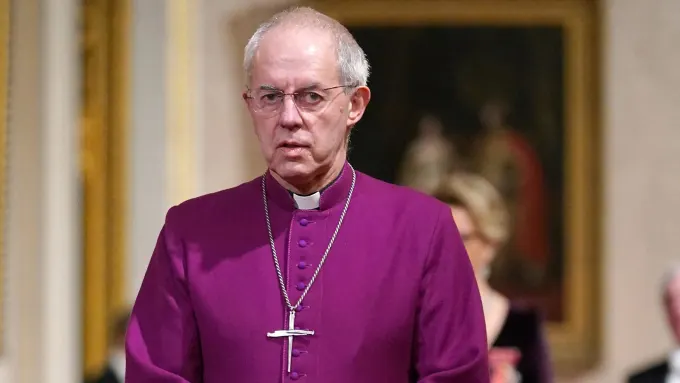
Archbishop Justin Welby Resigns as Primate of All England Amidst Abuse Scandal
The Most Reverend Justin Welby, the Primate of All England and spiritual leader of the worldwide Anglican Church, has announced his resignation, just days after a scathing independent report revealed extensive child abuse linked to the Church of England.
Welby, who has served as Archbishop of Canterbury for nearly a decade, expressed deep regret in his resignation letter, acknowledging both personal and institutional responsibility for the Church’s failures to act on the “heinous abuses” that took place.
In his statement, Welby said, “The recent revelations have brought to the forefront the long-standing and painful reality of safeguarding failures within the Church. I must take responsibility for these failures, both on a personal level and as the leader of the institution. This has been a profound moment of reflection for me, and it is with great sorrow that I step down. I do so in solidarity with the victims and survivors of these horrific abuses, who have suffered far too long without justice.”
The resignation comes after the publication of the Makin Report, which examined the historical abuse carried out by John Smyth, a British lawyer who had been involved in Christian boys’ camps funded by the Church. The report concluded that Smyth had subjected more than 100 boys to brutal and sexual abuse over a 40-year period. Smyth’s actions included beating young men with up to 800 strokes of a cane and providing diapers to absorb the resulting blood. The report also accused the Church of England of failing to act on these allegations when they were first brought to light in 2013, during Welby’s tenure as Archbishop.
While Welby expressed that he had no prior knowledge of the abuse before 2013, the report criticized his failure to ensure a full investigation into the allegations, a failure that allowed Smyth to continue his actions. The Church’s inability to act decisively when the abuse first came to light in 2013 has led many to question the leadership’s commitment to safeguarding vulnerable individuals within the Church’s care.
Welby’s resignation is seen by some as a necessary step in rebuilding trust within the Church, particularly among those who have been directly impacted by the abuses. In his resignation letter, he emphasized the importance of meaningful change: “I hope this decision will underscore the seriousness with which the Church of England is committed to making necessary changes to protect the most vulnerable and create a safer environment for all.”
Stephen Cottrell, the Archbishop of York and second-in-command of the Church, described Welby’s decision to step down as “the right and honourable course of action” given the gravity of the situation. Cottrell expressed support for Welby’s decision and noted that the Church must now look ahead to a future that prioritizes safety and accountability.
Throughout his tenure, Welby faced numerous challenges in navigating the growing divisions within the Anglican Communion. These included ongoing debates around LGBTQ+ rights, the ordination of women, and the differences between liberal and conservative factions within the global Church. While the Anglican Church in regions such as North America and Britain leaned toward more progressive stances, churches in African countries like Nigeria and Uganda have remained largely conservative. As a result, Welby’s leadership often faced resistance, particularly from African Anglican leaders who had expressed dissatisfaction with his approach on various issues.
Despite his resignation, Welby’s time as Archbishop has not been without its achievements. His tenure was marked by efforts to address global issues such as climate change and poverty, as well as his advocacy for refugees and marginalized communities. Nevertheless, his resignation underscores the deep concerns surrounding the Church’s handling of sexual abuse cases and safeguarding protocols.
The Makin Report, commissioned in 2019, brought to light the extent of the abuse carried out by Smyth, who had been a key figure in the Iwerne Trust, an organization that funded Christian camps in Dorset. Smyth had worked closely with Welby during his time at the camps, where he served as a dormitory officer before being ordained as a priest. The report detailed the horrific abuse that Smyth inflicted on young boys and young men, some of whom were subjected to physical and sexual violence for years.
Smyth had moved to Africa in the mid-1980s, where he continued his abusive behavior until his death in 2018. The report notes that had the abuse been reported to the authorities in 2013, a full investigation could have been conducted, and Smyth could have faced criminal charges before his death. The Church’s delayed response to these allegations has caused widespread outrage, particularly among those who have called for greater accountability within the institution.
Welby’s resignation sets the stage for the selection of his successor, a process that is now under close scrutiny. The Church of England follows a set procedure for appointing a new Archbishop, where two candidates are nominated by a body of clerics and the British prime minister. Two potential candidates to succeed Welby include Graham Usher, the Bishop of Norwich, and Guli Francis-Dehqani, the Bishop of Chelmsford. Usher, who has been vocal on issues like climate change and LGBTQ+ rights, is seen as a progressive figure, while Francis-Dehqani, who has a personal connection to the Iranian Revolution, would make history as the first woman to hold the position of Archbishop of Canterbury.
The next Archbishop will face a difficult task: healing the rifts within the Anglican Communion, rebuilding public trust, and addressing the ongoing decline in church attendance, which has dropped significantly in the UK since 2019. The focus on safeguarding will be crucial in the next leader’s mandate, as the Church of England works to recover from the scandal and reestablish its credibility.
As the Anglican Church navigates these turbulent times, the hope is that Welby’s resignation will mark the beginning of a new chapter focused on healing, accountability, and ensuring the safety of all who come under the Church’s care.





